Riding out the Pandemic
You may encounter many defeats, but you must not be defeated. In fact, it may be necessary to encounter the defeats, so you can know who you are, what you can rise from, how you can still come out of it.
It’s been a year now since COVID-19 changed our lives, so we thought we’d mix things up a bit and turn to our Connecticut-based moto artist friend Douglas Thompson (aka @tempusdeficit) to get a handle how people are coping under the strain of quarantine, lost jobs, lost income, and the mental stress incumbent in the loss of regular, in-person interactions with family and friends.
Thompson, who himself turns to motorcycling — a modified Triumph Thruxton — and art for solace, is a Licensed Professional Counselor with a Master’s Degree in Mental Health Counseling. The 41 year old is also a certified Acupuncture Detox Specialist (ADS). He's been working in the field since 2006, and been licensed since 2009. We are honored to share his thoughts.
1) Thank you for taking the time to talk with us. For you, what has been the number one issue people have had to deal with over the past year under the conditions forced upon them by the current pandemic?
The pandemic has hit all of us hard in one way or another. I think the ways it affects us can be pretty broad, so it’s hard to nail it down to one issue. Everyone’s situation is different. Of course my first thought — given what I do — is the toll it takes on our mental health. Every other issue affects that, somehow.
Some of us are immunocompromised, or have family members that are. Some of us have been furloughed or laid off. We’ve watched beloved local businesses wither and close. I think one of the hardest parts is the isolation we’ve felt. ZOOM and other video apps are a poor replacement for sharing space together. I miss shaking hands and hugging people. I miss social gatherings, birthday parties and graduations. I think we’ve gotten used to the masks and the six feet of social distancing for the most part, but the isolation is tough. It’s like going out for a ride but the whole route is nothing but speed bumps and potholes — we’re riding along, but it’s hard to enjoy. People are social beings; interaction keeps us emotionally healthy. For anyone who struggles with mental health issues, this isn’t helping.
2) From your experience with patients, what is the general overall feeling you are getting from people … and is there a glimmer of hope in there with the news that vaccines are more readily available?
It seems like different views of the pandemic are all over the map. Some people just want this all to be over, and have jumped the gun on big gatherings, not wearing masks, and all that. They want it to be over so badly that they stop being cautious, and it’s concerning. There’s a lot of ignorance. I do a lot of telecounseling, but I still see clients in person, and I have to remind a lot of people to keep their masks on. I do a lot of education on why the idea that it’s hard to breathe in a mask is just not a legitimate argument. It’s unfamiliar and possibly uncomfortable, yes, but you can breathe just fine. Not wearing a mask is inconsiderate, dangerous and unacceptable. We’re not out of the woods yet.
Personally, I was eager to get the vaccine, and as a healthcare worker it was available to me early. Some people are eager to get it, and some take some convincing. I’ll share my enthusiasm for the vaccine with anyone that’ll listen, and I’m happy to address misinformation with anyone who has concerns about it, or tells me they heard it 'wasn’t that effective' or something. There was plenty of anti-vaxx sentiment prior to the pandemic, and I don’t think it’s gone away. Overall, though, I think that vaccines becoming available so quickly now is bringing some hope, and we need it!
Balloon | Seth — Douglas Thompson
Adapting to challenges is something we as human beings do exceptionally well. I can’t imagine the past year without the technology that exists right now. It’s like making fire — it brings light, and at the same time it’s easy to get burned.
3) What demographic do you primarily treat? Does age, gender, race play at all into both what people are going through and how they deal with it? I heard a joke regarding my Gen X status, that my generation of introverts was born to deal with these isolated times. Is there truth to this?
At the behavioral health agency where I currently work, I see adults. There are so many variables at play that make every case unique. It’s like cooking, in that every ingredient impacts the whole picture. Except in counseling, it’s like reverse engineering the dish, trying to understand what went into it from what’s on the plate front of you. The answers aren’t always obvious. But like cooking, you learn as you go. 'Next time I won’t add so much salt,'' and so on. What I mean to say is, yes, things like age, gender and race and lots of other factors combine in lots of different ways, and impact how we experience and react to adversity. Being a Gen X’er myself, I get the joke, but if quarantine sounds like a good time to you, there might be some deeper issues at play.
 4) And have these times pushed people even more into relying on things like social media – almost unhealthily so – for comfort and companionship?
4) And have these times pushed people even more into relying on things like social media – almost unhealthily so – for comfort and companionship?
'Addictive' and 'toxic' are the first two words that come to mind when I think of social media. The sociopolitical events of the past four years haven’t helped that … and yet, I believe that recent social movements have organized so much more effectively because of the tools available to us through social media.
Again, being a Gen X’er, I’m nostalgic for a time when GPS apps didn’t exist yet … when I relied on terrible MapQuest directions, and checked the paper maps I kept in my glove compartment if I got lost. When things really went sideways, I’d call my dad on a Nokia that did three things: make phone calls, send text messages, and play Snake. I barely used it for anything but dialing phone numbers. And yet, here I am in 2021 and I spend more time on my phone than I care to admit. We interact online so much more today, and I believe it’s undermined IRL interactions. I have to wonder what we’re going to look like as a society coming out of this. But again, it’s got its advantages, and adapting to challenges is something we as human beings do exceptionally well. I can’t imagine the past year without the technology that exists right now. It’s like making fire — it brings light, and at the same time it’s easy to get burned.
5) I recently read that people who have lower earning jobs that were lost over the past year are now being told normalcy and a return to work could be as far away as 2024. How do people deal with these facts?
I think we’re just overloaded with information at this point. I try to help people focus on their present situation and what they can do right now. But again, therapy isn’t one-size-fits-all, and everyone’s situation is different. I’m primarily helping with the emotional impact, focusing on solutions, and finding where, realistically, there’s bright spots of hope to be seen.
Chasing Joy (13x19) | Bayonne — Douglas Thompson
Adapting to challenges is something we as human beings do exceptionally well. I can’t imagine the past year without the technology that exists right now. It’s like making fire — it brings light, and at the same time it’s easy to get burned.
6) What advice as a therapist can you give to people who may be overwhelmed by life right now?
If you’re seeing a therapist, keep going. If you’re not seeing a therapist, now is the time. Everyone’s doing telecounseling now, too, so there’s no reason not to. You don’t even have to leave your house.
7) Getting more personal, how have you and your family been over the past year? And what is your secret, especially considering you are dealing with other people’s issues on a daily basis, to keeping healthy, happy and sane?
I have to be really mindful of the secondary trauma that comes with doing this work. I need to do my own self care, because it’s overwhelming when you don’t. Burn out comes very easily in this field.
It’s wonderful working from home for a large portion of my work week, with my kids distance learning and my wife also working from home. It’ll be a tough transition back, for me, when this eventually ends. Although, it’s also more difficult in some ways. I’m interacting less with my coworkers, and I’ve always found that peer supervision is incredibly important to the process of doing therapy and then coping with it on the back end. It’s harder in that way. I’ve got a group text going with a couple coworkers I’m close with, and we vent on there pretty much daily. I’m looking forward to doing this stuff in person again, but for now, thankfully the technology is there to give us these alternatives. Not a replacement, but an alternative. I guess I could say that our smart phones and social media are the soy milk of social interaction.
Of course, you know I’ve said in the past that my artwork is one of my escapes. It helps me cope with the seriousness of my work. Strangely enough, though, while I know that many people have found new hobbies and been more creative as a result of the isolation that COVID has imposed on us, I can’t say the same. If anything, I’ve had less time for my art.
My family’s been blessed in that none of us have had COVID. If I have a secret, it’s gratitude.
8) What resources, online or otherwise, do you recommend to people who may just need to talk to someone?
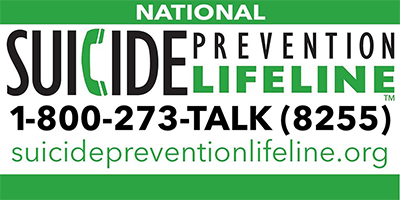 First thing's first: if you are in crisis and need immediate help, please call: 1-800-273-TALK (8255). That's the National Suicide Prevention Lifeline. If your life or someone else's is in immediate danger, either call 911, or go to your nearest emergency room for help. New York State has also partnered with the Crisis Text Line, an anonymous texting service available 24/7. Start a conversation by texting GOT5 to 741741. You can also locate a CPEP (Comprehensive Psychiatric Emergency Program) by clicking here.
First thing's first: if you are in crisis and need immediate help, please call: 1-800-273-TALK (8255). That's the National Suicide Prevention Lifeline. If your life or someone else's is in immediate danger, either call 911, or go to your nearest emergency room for help. New York State has also partnered with the Crisis Text Line, an anonymous texting service available 24/7. Start a conversation by texting GOT5 to 741741. You can also locate a CPEP (Comprehensive Psychiatric Emergency Program) by clicking here.
There are more useful hotline numbers listed on opencounseling.com.
To find yourself a therapist, a good place to start might be nycwell.cityofnewyork.us. This site also lists free digital mental health services during the pandemic.
There's betterhelp.com, opencounseling.com, psychologytoday.com and lots of other online resources for finding a therapist. Your insurance carrier can also provide you with a list of in-network mental health providers in your area, or ask your primary care provider for a referral.
Doubts | Happiness is Around the Corner — Douglas Thompson
9) And, even more importantly, how do you recognize if someone in your circle of friends, colleagues and family need a helping hand, especially if they are afraid or too embarrassed to ask for that help? And is there a way to provide that help in a kind and loving fashion that helps without making people feel poorly about themselves?I think we’re just overloaded with information at this point. I try to help people focus on their present situation and what they can do right now. But again, therapy isn’t one-size-fits-all, and everyone’s situation is different. I’m primarily helping with the emotional impact, focusing on solutions, and finding where, realistically, there’s bright spots of hope to be seen.
Check in on your friends and loved ones. Help normalize the conversation around mental health by having lots of those conversations. Offer to help them find the mental health resources they might need. Share your experiences, as much as you’re comfortable with. Most importantly, be patient with each other. Just acknowledging that you’re struggling in some way can be a big hill to climb for most people. We’re like the Black Knight in Monty Python’s classic movie The Holy Grail ... telling everyone else that ‘it’s only a flesh wound!'. You can’t force someone to be vulnerable with you. What you can do is be patient and supportive, and give them the space to get there in their own time.
10) Finally, knowing you, it is very apparent that your own personal art – combining motorcycles with fanciful depictions of flight with balloons and kites – is therapy for you. What is it about the subjects you choose, the process of creating and the final outcome that gives you inner peace?
The visual language I’ve developed, centering on images of floating bikes and balloons, is very symbolic. I’m creating these as a counterpoint to the heaviness of my profession. On a motorcycle, there’s no room for distraction; it’s very meditative. It’s hard for the troubles of the world to get up inside your helmet with you; there’s only room for peace in there. Riding a motorcycle is such an inherently joyful act. I want my art to reflect that.
For more: Riding a Motorcycle Can Decrease Stress & Improve Mental Focus
Thanks for taking the time to talk with us on a vital subject in these troubling times. We also wanted to say we are honored to welcome you to the NYC Motorcyclist fold as an advisor and contributor. Peace, Love and Light ... what the world needs more of.
What You See Depends On What You Look For — Douglas Thompson
A B O U T D O U G L A S T H O M P S O N
For more information on Douglas Thompson or to purchase art, visit him online at etsy.com or on social media:

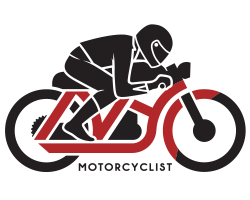


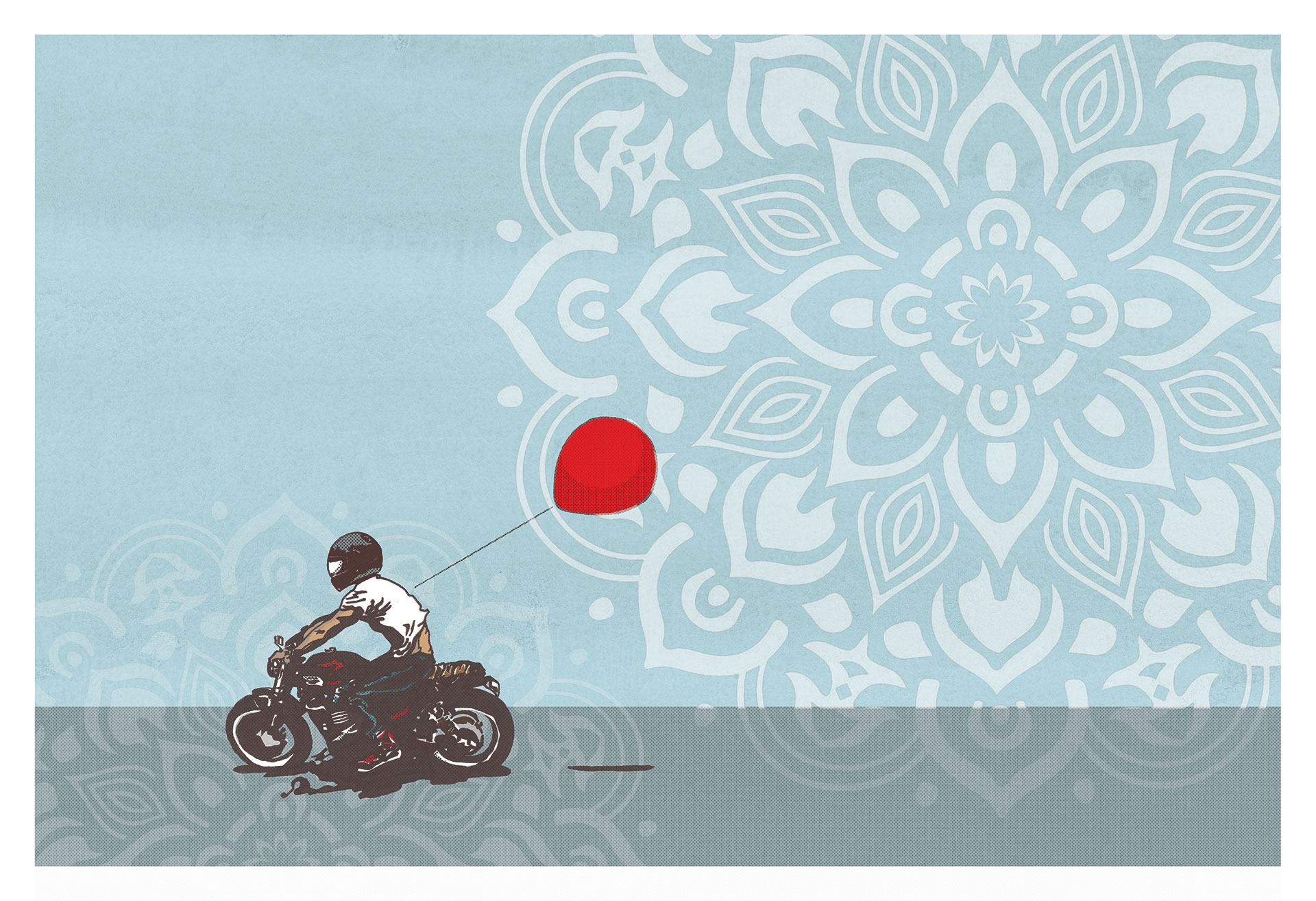
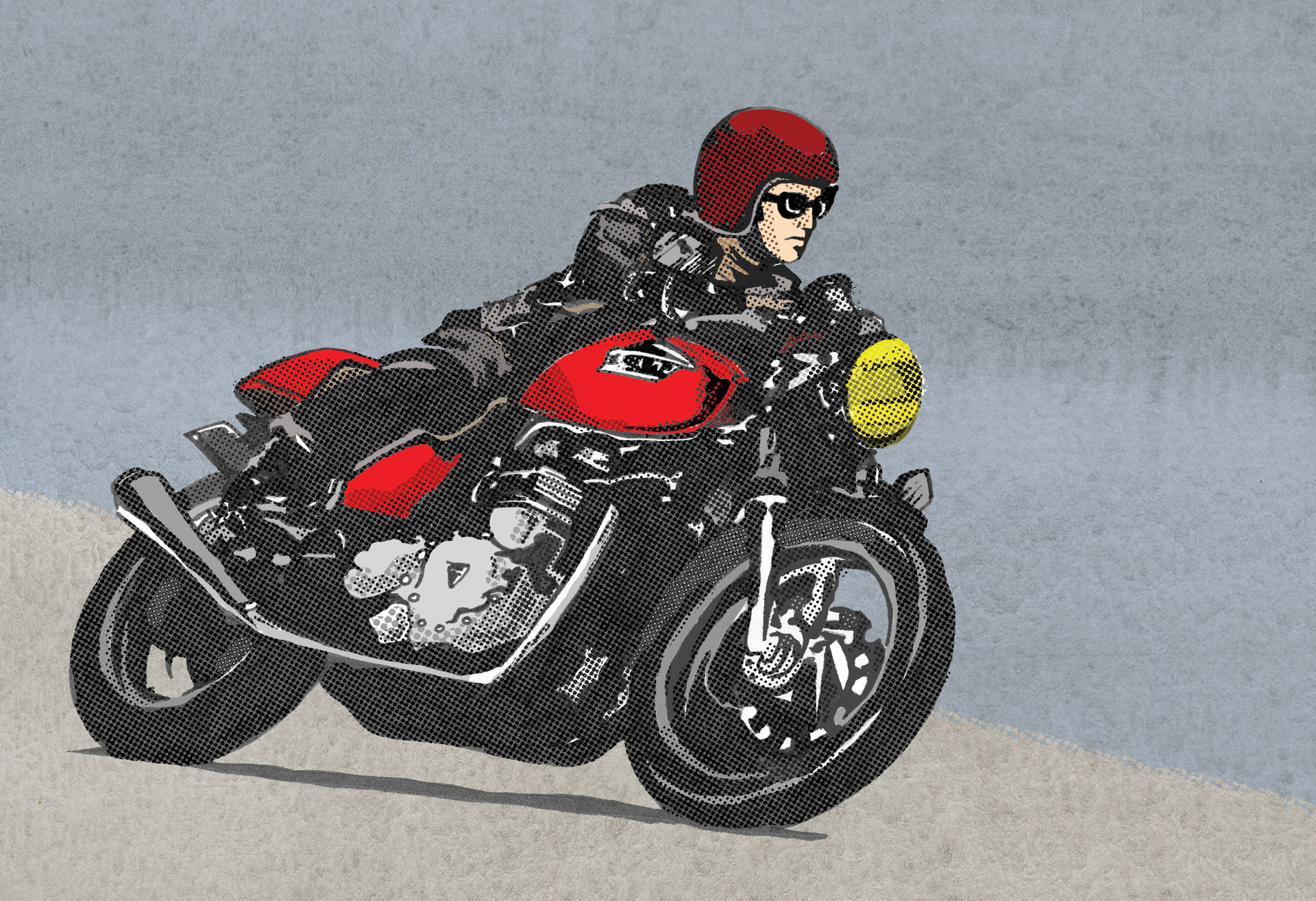
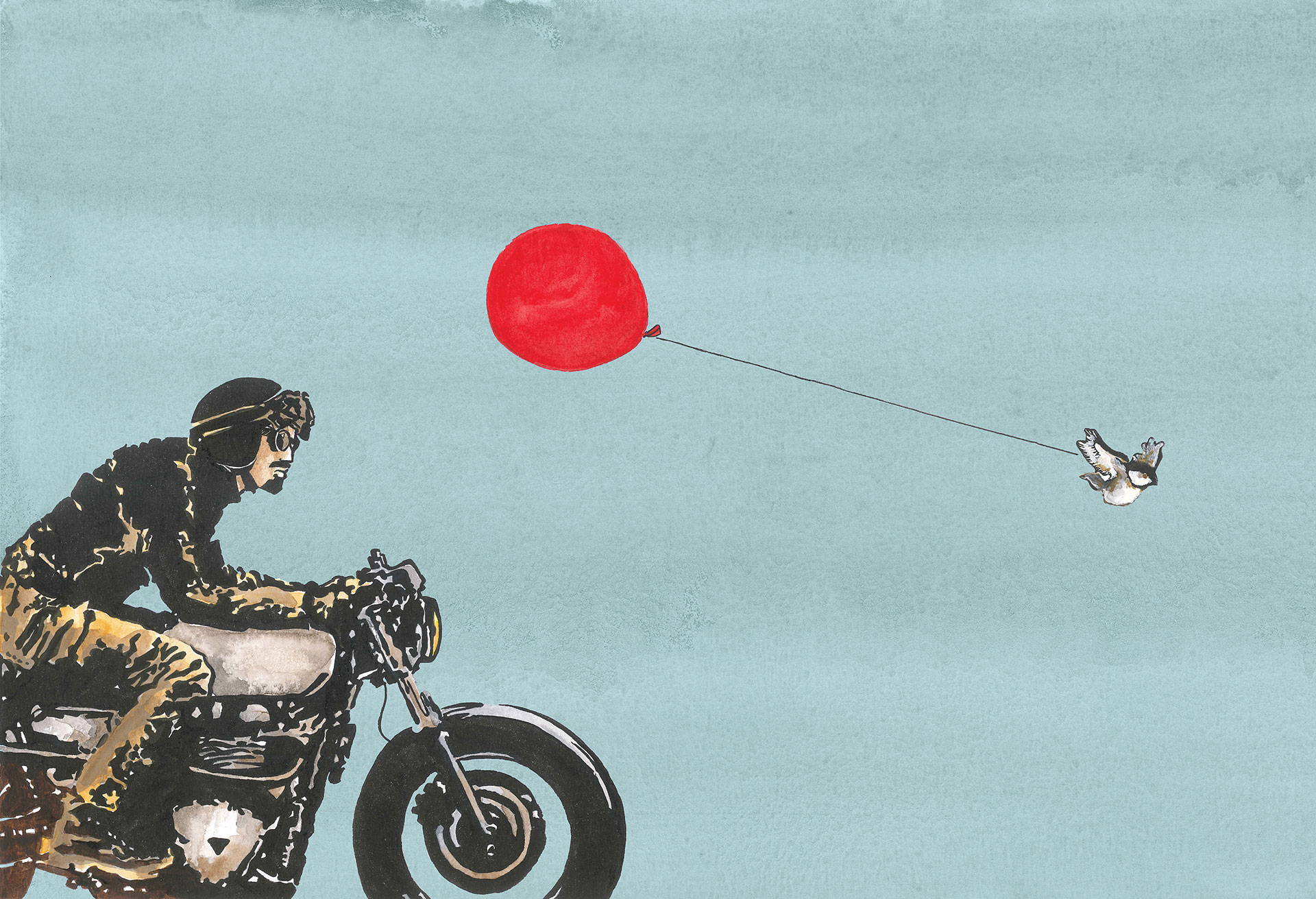
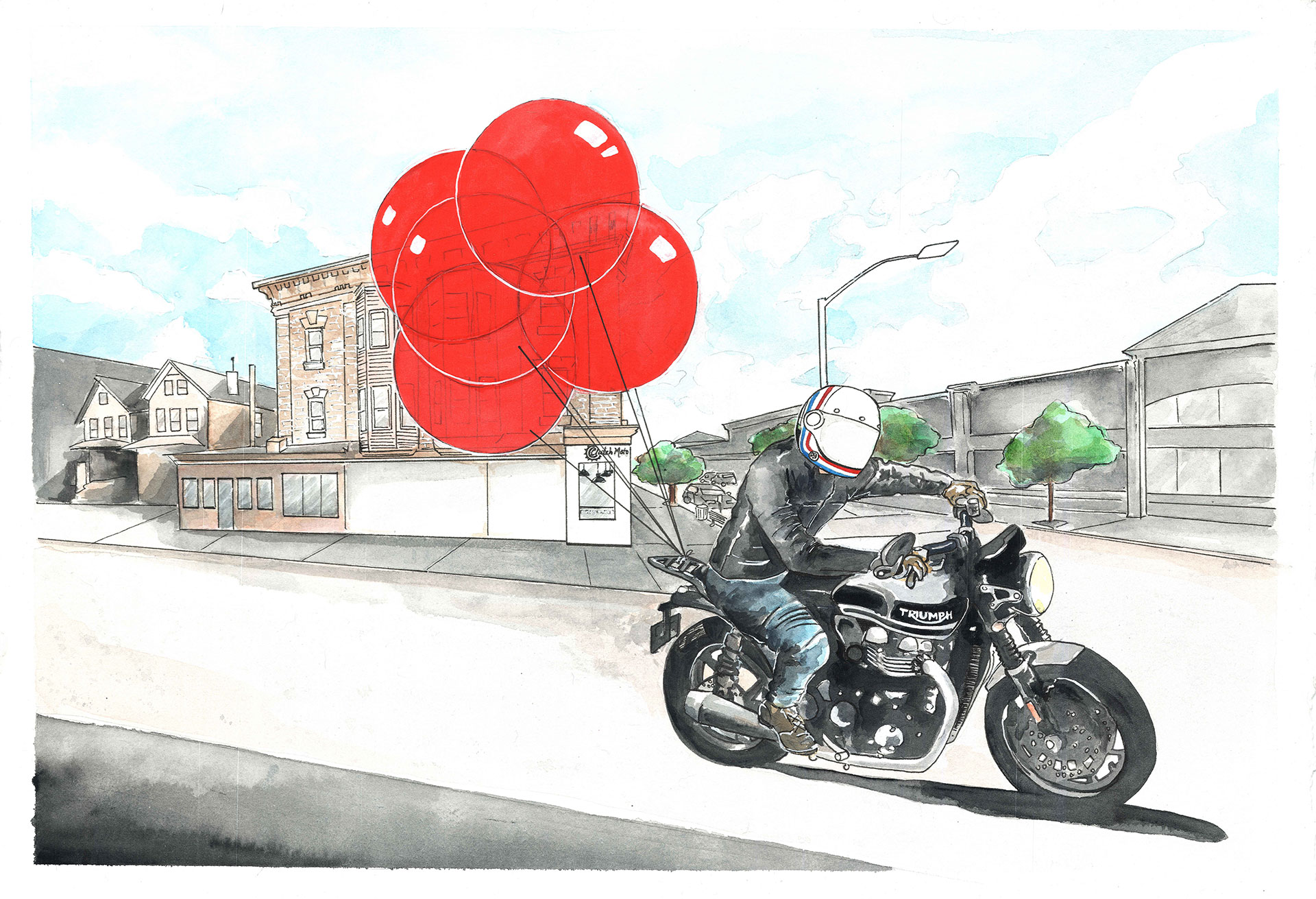
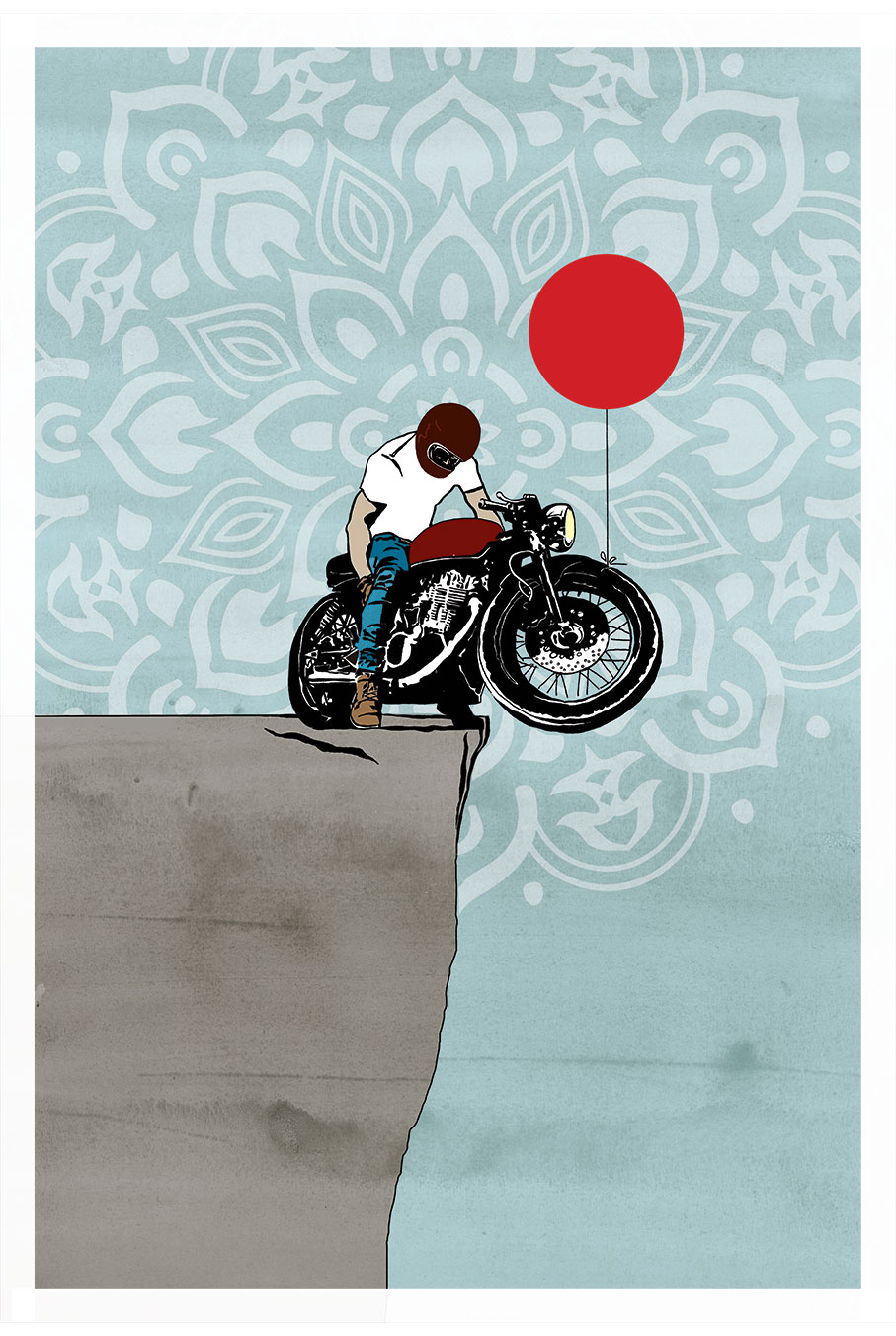
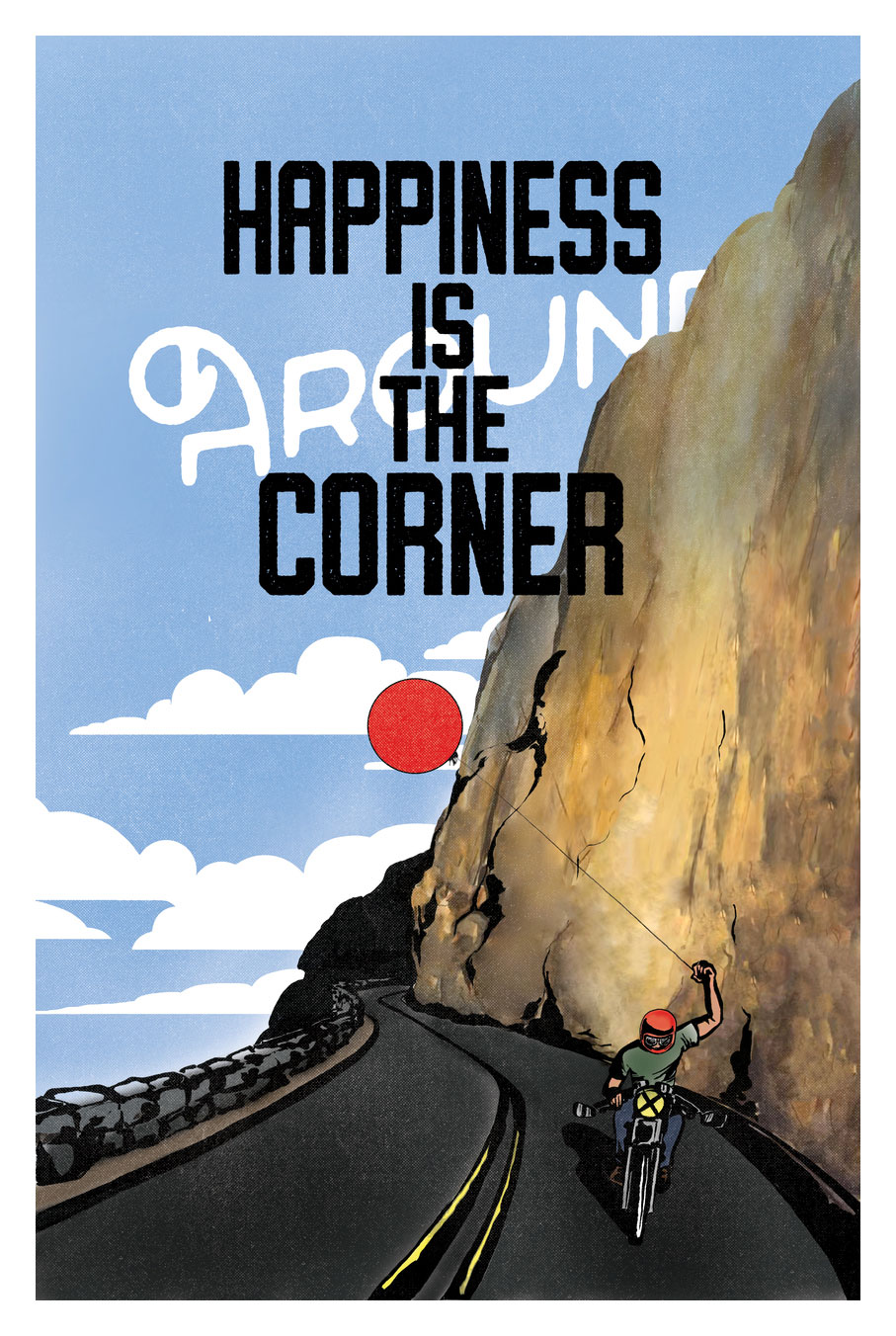
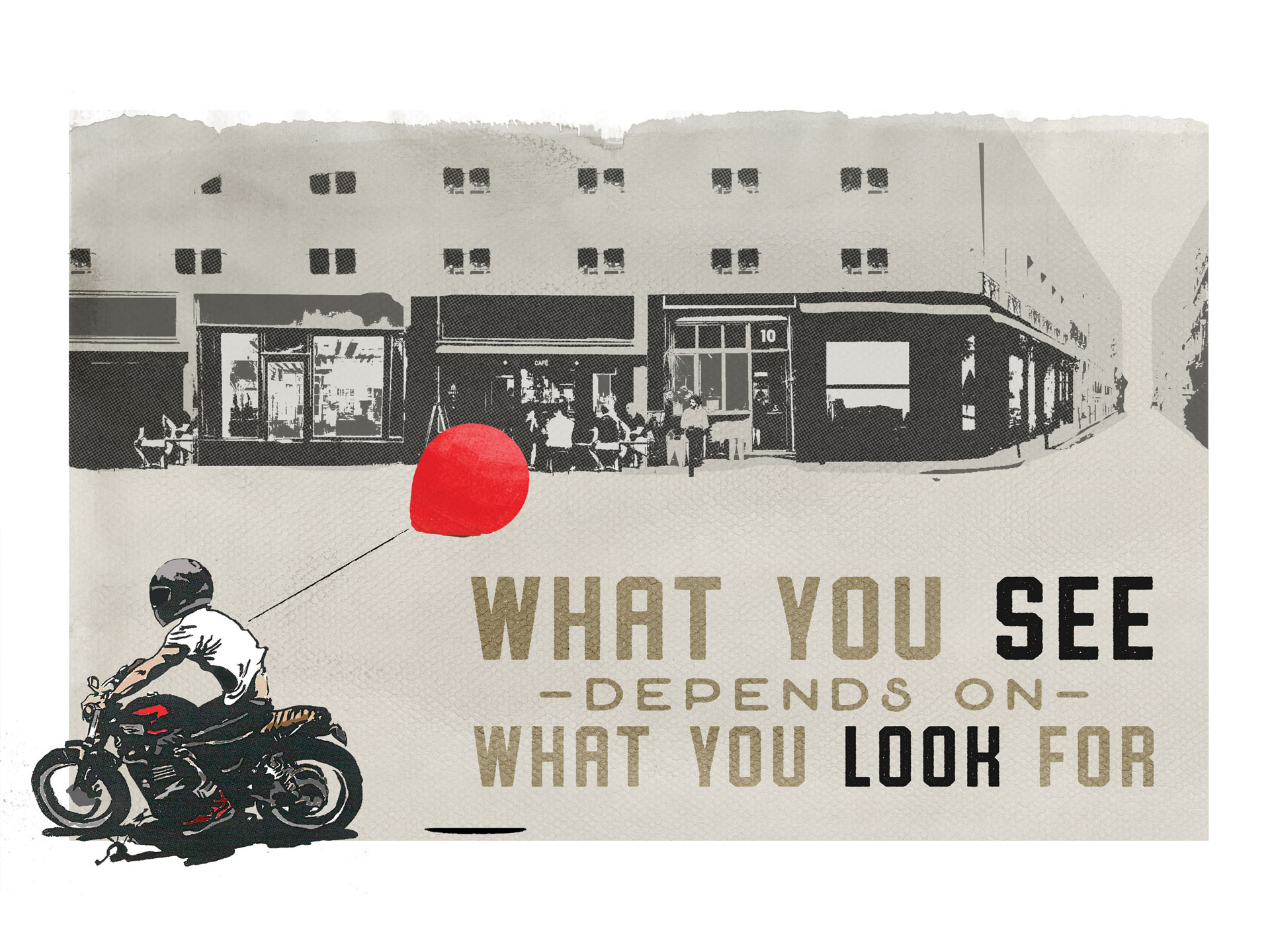


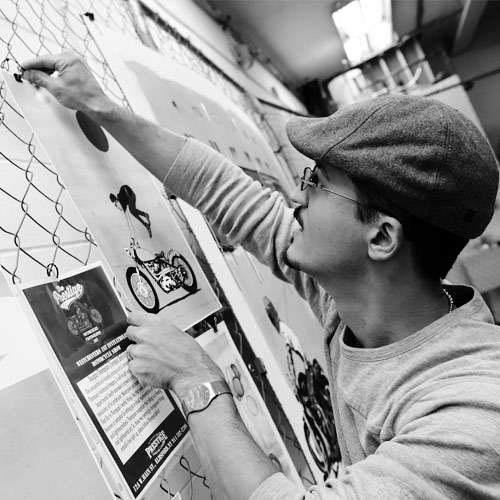

🖤🖤 Much love, Rahoul. Thank you @nyc_motorcyclist for calling attention to the stuff that bounces around inside our helmets. This interview, which highlights the wear and tear of the pandemic on our mental health, reminds us that our brains — like our bikes — need regular maintenance too. 🖤🖤
Bravo my friend 👏👏👏
Awesome Doug. 👏